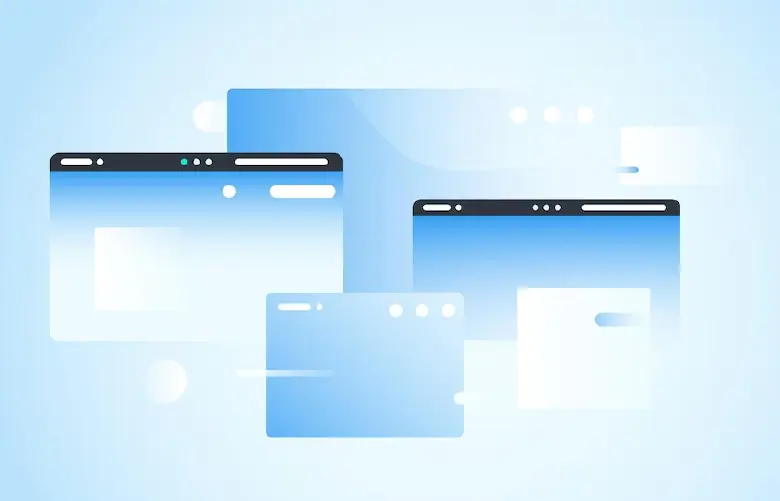Operating systems are the backbone and guiding force of all computing devices, including servers, smartphones and computers. It acts as a bridge between software and hardware, efficiently managing all the resources essential for the proper execution of programs and provision for a user interface. However, technological advancements have led to the formation of five major types of operating systems, which will be discussed in detail. Gaining knowledge about all these types of operating systems will prove beneficial for one in the long run.
What Is An Operating System?
Before delving deep into the operating system types, it is essential to know what an operating system is. In the simplest term, an OS serves as an interface between the hardware of the computer and its various applications. It effectively controls the memory, output and input devices, storage, and processing power and offers a platform for smoothly running applications.
There are a wide variety of essential services that are offered by different types of the operating system. The most common and essential operating system types are as follows:
- Management of memory
- Management of files
- Security
- Process management
- Upgrades and new features
Every computing device requires an operating system to function. Therefore, to cope with people’s varied choices and requirements, different types of operating systems have been launched in the market. A detailed discussion about all these major types of operating systems is attempted below. If you entertain further curiosity, you can learn about DevOps & Cloud Engineering. Also any student with Full Stack Developer Certification should know all about all the major types of operating system.

Get curriculum highlights, career paths, industry insights and accelerate your technology journey.
Download brochure
Different Types of Operating System

There are several types of operating systems depending on the device, manufacturer and user preference. Let’s look at some of the major types of operating system in detail:
- Batch Operating System
- Multiprogramming Operating System
- Multitasking Operating System
- Time-Sharing Operating Systems
- Distributed Operating System
- Network Operating System
- Real-Time Operating System
1. Batch Operating System
This type of operating system generally processes a massive number of similar jobs in batches without the requirement of any user interface. The batch OS comes with several notable advantages, including:
- Enhanced efficiency
- Reduced idle time,
- Simplification of maintenance
- Cost effectivity.
However, although known for its incredible advantages among all the other operating system types, there are also several disadvantages of this type of operating system. The main disadvantages include the following:
- Lack of interactivity
- Limited flexibility
- Limited capability
You can also look at the Advantages and Disadvantages of Cloud Computing.
2. Multiprogramming Operating System
This type of operating system allows multiple programs to run on a computer system simultaneously. Multi program OS comes with several advantages and disadvantages, which are mentioned below:
Advantages:
- Enhanced efficiency
- Improved throughput
- Improved user productivity
- Enhanced resource sharing
Disadvantages:
- Increased overhead
- Resource Contention
- Security Risks
- Complexity
3. Multitasking Operating System
This type of operating systems allow multitasking or running multiple processes on the computer system. The system is similar to that of a multiprogramming OS. Therefore its’ advantages and disadvantages are also similar.
Advantages:
- Better user productivity
- Improvement in sharing of resources
- Enhanced throughput
- Better efficiency
Disadvantages:
- Risks concerning security
- Increased overhead
- Contention of resource
4. Time-Sharing Operating Systems
This type of operating system allows several users to share a computer system and offers each user a limited portion of CPU time. The system comes with its advantages and disadvantages.
Advantages:
- Improved performance
- Elimination of interruption
- Allows multitasking
- Improve the utilisation of resources
Disadvantage:
- Issue of reliability
- Lack of security
- Problem concerning data communication
5. Distributed Operating System
This is one of the most popular among the different types of Operating System. The distributed OS allows multiple computers to collaborate and work as a single system. They wildly entertain job services by multiple CPUs.
Advantages:
- Enhanced functionality and flexibility
- Autonomy
- Horizontal scaling
- Cost-effective
- Lower delay
Disadvantages:
- Difficult distributive system setup
- Overloading issue
- Security risks
Look here to know the Difference Between Public Cloud and Private Cloud.
6. Network Operating System
This type of operating system coordinates and controls the various resources of a computer network. The system entertains its advantages and disadvantages, which are discussed below.
Advantages:
- Centralised management
- Enhanced resource sharing
- Easy recovery and backup
- Improved security
Disadvantages:
- Performance and compatibility issues
- Higher cost
- Complex
7. Real-Time Operating System
This type of operating system is primarily designed for applications that require strict timings.
Advantages of the real-time operating system:
- High responsiveness
- Reduced latency
- Predictability
- Resource efficiency:
Disadvantages:
- Limited functionality
- Higher cost
- Lack of flexibility
If you are ambitious about learning cloud computing, you can look at the Introduction to Cloud Computing Deployment Models.
Common Operating Systems
Once you are well aware of the operating system types, it becomes essential to gain knowledge regarding the most common OS that are widely used. Read below to learn about them in detail.
1. Microsoft Windows
Developed and designed by Microsoft Corporation, Microsoft Windows has become quite popular in the market due to its distinctive and incredible features. These features include:
- Graphical User Interface
- Plug and Play
- Compatibility
- Constant updates
- Multitasking
- Security

This type of operating system has availability in various editions like Windows Server, Windows 7, Windows 8 and Windows 10. Each server is customized and tailored to meet the user’s specific requirements. The system can also be customizable and beneficial for personal and business use.
2. Apple iOS
Apple Inc developed this mobile OS, serving as the primary OS for Apple’s iPhone, iPod, and iPad. It comes with key features such as:
- Inbuilt app store
- Enhanced security
- Multitasking
- User interface
- Regular updates
- Integration
This type of operating system is efficient for use and user-friendly, offering users a seamless experience. Having a strong focus on privacy and security, it entertains end-to-end encrypted FaceTime calls and iMessaging. It has gained immense popularity and is beneficial for both personal and business purposes.
3. Google Android
Google Android is also a type of operating system. It is meant to run on smartwatches, tablets, smartphones, and many other devices. Some of the key features offered by Google Android are as follows:
- Open source
- Multitasking
- Inbuilt app store
- Customisability
- Regular upgrades and updates
The system offers many Google services, features, and benefits that increase users’ popularity. It, however, aims to improve and evolve.
You can also learn about the 3 Major Types of Cloud Service Models – Characteristics and Benefits Explained.
Conclusion:
In this article we have covered all the major types of operating system in computers that people use for various purposes in the modernized and tech-savvy world, there is always an expectation to come across new OS offering unique capabilities and features. However, these five major operating system types will continue to take their central position in the oeuvre of computer technology.
FAQs
Computer systems with two or more central processing units working together to perform essential tasks are called multiprocessor systems. Advantages of multiprocessor systems are:
- Enhanced performance
- Better utilisation of resources
- Scalability
- Improved reliability
- Support for parallel processing
There are various types of the operating system; the five major types are as follows:
Desktop operating systems: The design and development of this kind of operating system are restricted to workstations and personal computers. Some typical examples of desktop operating systems are Mac OS, Linux, and Microsoft.
- Server operating systems: This type of operating system is specially designed to be used on servers. These offer service to other computers. Some examples include UNIX, Linux servers and Windows servers.
- Mobile operating systems: This system is typically designed for mobile devices, including cell phones and tablets. Some examples are Android, IOS and Windows Mobile.
- Real-time operating systems: These systems are specifically designed for other systems that need rapid response times, like embedded systems or industrial control systems. Some examples are QNX, VxWorks and eCos.
- Cloud operating systems: These types of operating system are designed to operate on cloud computing platforms, which provide on-demand and scalable computing resources on the internet. Examples include Amazon Web Services, Microsoft Azure and Google Cloud.
The main difference between 32-bit and 64-bit OS is the amount of memory they address. The maximum addressing capacity of the 32-bit operating system is 4GB of RAM (random access memory). On the other hand, the addressing capacity of the 64-bit operating system is much larger and can go up to several terabytes depending on the operating system type.
The difference between Firmware and OS is that they are two different kinds of software that serve distinct purposes. Firmware is embedded in hardware devices like the primary output and input system of the computer and the control panel of the printer, among many more.
While an OS is designed to manage the computer's resources and offers a platform for successfully running applications, another difference is that firmware storage is typically done in non-volatile memory. In contrast, the installation of the OS is done on the hard drive of the computer. This makes it easier to upgrade or update it.
Updated on September 13, 2024










